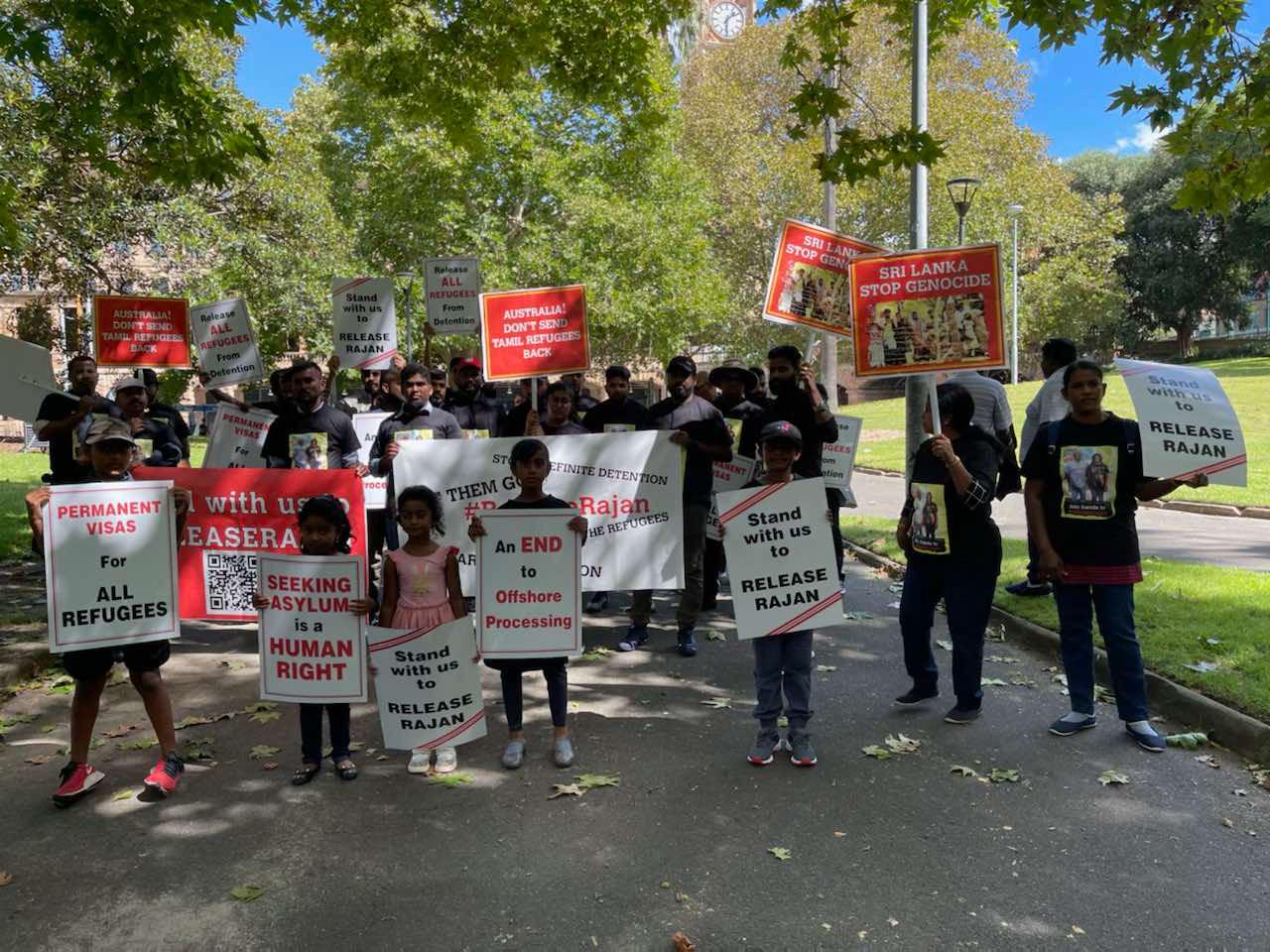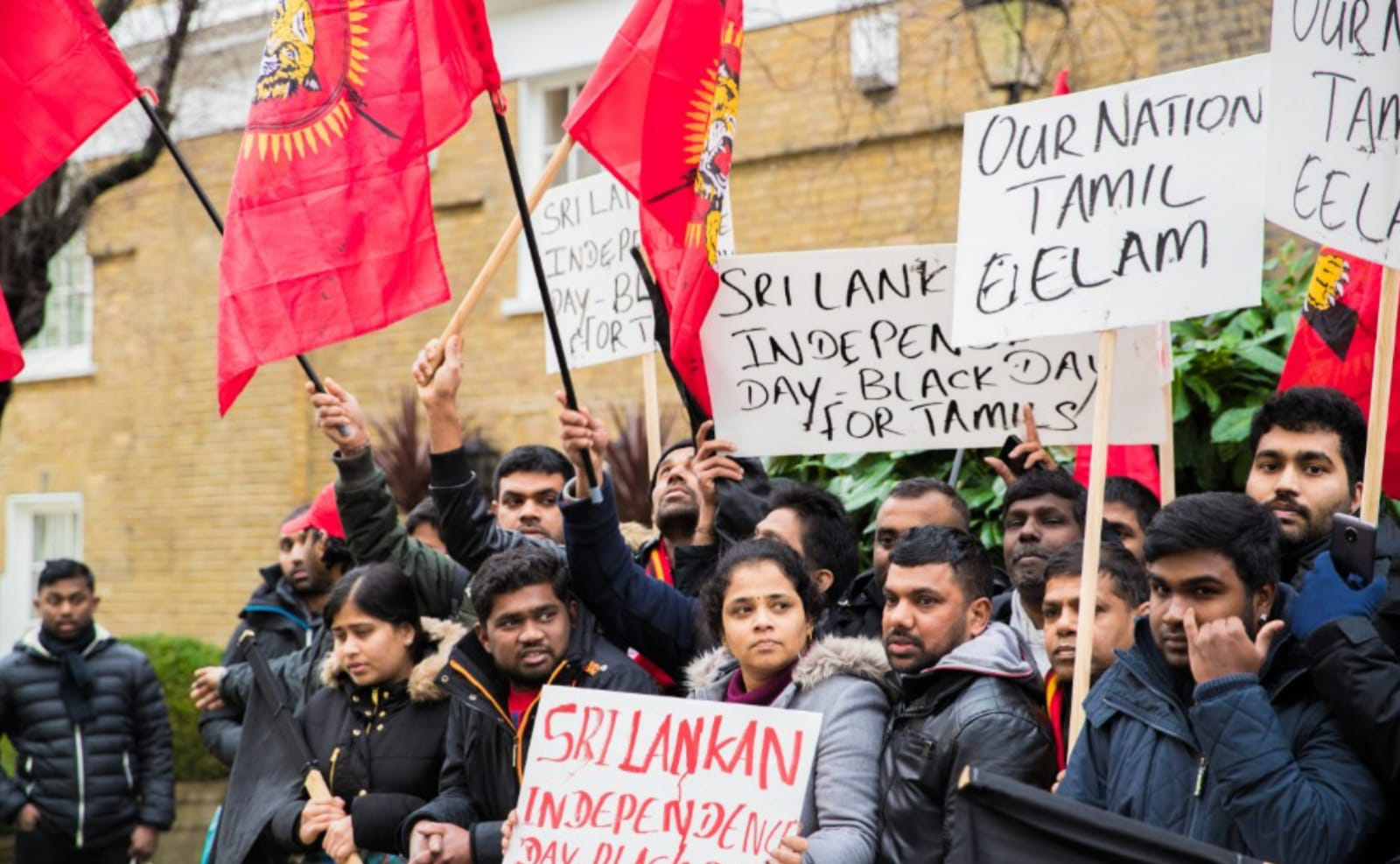
British Tamil protestors in London, 2019.
A landmark decision from a British tribunal last week found that Tamils who engage in a range of political activities in the United Kingdom may continue to face “a real risk of ill-treatment or harm” if deported to Sri Lanka, in a significant ruling that clarifies and expands those who may face persecution on the island.
The ruling, which centred on the asylum appeal of two Tamil refugees in the UK, known as KK and RS, importantly expands the criteria of those who may be at risk in Sri Lanka, taking into account a range of activities from posting on social media to attendance at commemorative events and even signing petitions that could be “perceived as being anti-government”.
Previous British country guidance had stated that only those who have a “significant role” in Tamil activism overseas faced the risk of persecution on the island. However, the latest decision from the Upper Tribunal states that Sri Lanka may target more than those who hold formal positions in diaspora organisations and listed a range of activities, carried out both through organisations or as individuals, that may place a person at risk.
“[Sri Lanka] draws no material distinction between the violent means of the LTTE and non-violent political advocacy,” the Tribunal noted. “To this extent, Government of Sri Lanka's (GoSL) interpretation of separatism is not limited to the pursuance thereof by violent means alone; it encompasses the political sphere as well… there is no tolerance of the expression of any avowedly separatist or perceived separatist beliefs.”
“It is abundantly clear that there is a reasonable likelihood that those detained by the Sri Lankan authorities will be subjected to persecution,” the Tribunal declared.
The judgement went on to state that there was also the need to apply wider principles of refugee law when examining cases of Tamil asylum seekers, highlighting the HJ (Iran) principle – a 2010 ruling that was affirmed in 2012. It added that “if it is found that the individual would not seek to express their separatist beliefs on return… to avoid the risk of persecution and serious harm, they are entitled to international protection.”
“The ruling was very comprehensive, clear and closely argued,” Alasdair Mackenzie, a barrister at Doughty Street Chambers that was instructed to the appeal, told the Tamil Guardian. “It makes clear that you do not have to have prominent positions within diaspora organisations, as long as you can prove you are committed to the cause.”
“Tamils have been fleeing the island of Sri Lanka in fear of racist persecution for decades following the 'Black July' pogrom in 1983,” said Together Against Genocide (TAG) director Jan Jananayagam.
“Within weeks of this act of genocide, knowing that Tamils were fed up with racism, the Sinhala state passed the ‘6th amendment’ to its Sri Lankan constitution criminalising Tamil political aspirations towards independence. Anyone who believes in freedom for the Tamil people has been at risk of persecution regardless of how they pursue this objective.”
‘An authoritarian regime’
.jpg)
Soldiers parade through Colombo before Sri Lanka's president and leaders of the armed forces, 2020.
The latest ruling, which builds on previous country guidance on Sri Lanka from 2013, made several key findings, including labelling the Government of Sri Lanka “an authoritarian regime whose core focus is to prevent any potential resurgence of a separatist movement”.
Giving evidence to the Tribunal, analyst Dr Chris Smith described how the current Sri Lankan regime had taken “disconcerting” steps towards “authoritarianism and militarisation”.
The Tribunal agreed, stating that there “was an entrenchment of the presence of military personnel in the power structure of government”.
It went on to note,
“The possible repeal of the PTA envisaged by the previous government was firmly discounted. There is also ample evidence of journalists and others who have sought to investigate alleged wrongdoings by political and military leaders being targeted for harassment and intimidation. There is nothing to suggest that the phenomenon of what was described in GJ as the “Sinhalisation” of Tamil areas has been reversed and the FFM contains evidence that there continues to be a degree of “colonisation” by Buddhists.
The evidence as a whole clearly shows that there is a very large military presence in the north and that the army still occupies a good deal of land previously owned by the Tamil population before the end of the civil war”.
Dr Suthaharan Nadarajah, an International Relations lecturer at the School of Oriental and African Studies in London, also provided expert evidence, stating that the Sri Lankan government remains “committed to a general mobilisation against potential LTTE resurgence and Tamil separatism… which… has also been conflated with Tamil and international advocacy campaigns which are perceived as serious threats to both Sri Lanka and its apex political and mid military leadership”.
“Tamils who participate, or are suspected to have participated, in a range of Tamil diaspora political activities that are perceived by the Sri Lankan authorities as working to advance the cause of Tamil separatism… are at real risk of persecution or serious harm on return to Sri Lanka, whether in detention or otherwise,” he added.
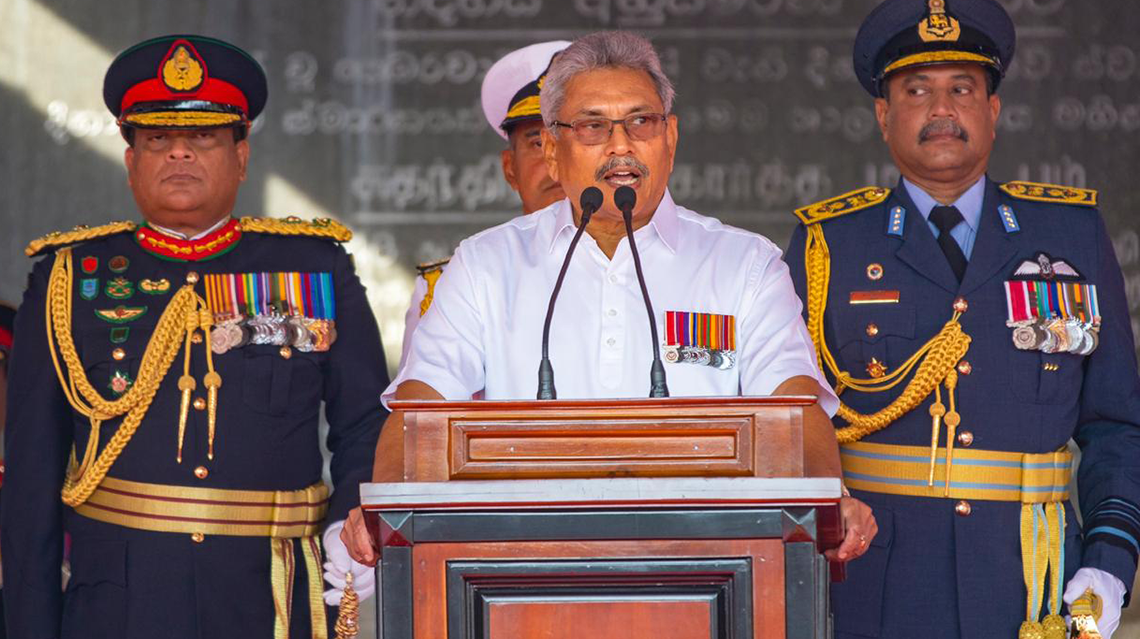
Sri Lankan president Gotabaya Rajapaksa delivering a speech in Colombo flanked by the heads of the armed forces, 2020.
The Tribunal also said it attached “considerable weight” to a 2014 article authored by Sri Lanka’s current president, and then defence secretary, Gotabaya Rajapaksa, who spoke of “pro-LTTE elements overseas” as a “major national security threat that needs to be taken with the utmost seriousness”.
It stated the article “sets up a link (actual or perceived) between ostensibly non-violent democratic groups and the threat (again, actual or perceived) of a revival of violent separatism; a threat that is, we conclude taken seriously now, as it was then”.
Professor Rohan Gunaratna, a controversial lecturer at Nanyang Technology University in Singapore, also gave evidence to the Tribunal, stating that the Sri Lankan authorities will “always” take action against a returnee that has either “engaged or planned to engage in a terrorist operational or support activity”. In Professor Gunaratna’s view, “terrorist support activity” included: disseminating propaganda; lobbying; participating in demonstrations; displaying of terrorist paraphernalia; raising funds; procuring supplies; and organising similar activities.
“Leadership, membership or association of a listed, delisted or unlisted terrorist organisation is taken seriously by the Sri Lankan authorities,” he added, stating that the “anger” of the security forces is instead directed towards the “LTTE front, cover and sympathetic organisations operating from overseas masquerading as diaspora organisations and exploiting the liberal/human rights systems in the Western countries”.
“Anyone” connected with these organisations would be arrested and interviewed “regardless” of the level of their involvement, Professor Gunaratna continued.
“It follows as a matter of logic that GoSL views the “entire” overseas Tamil population with a generally adverse mindset,” the Tribunal concluded.
'Infiltrators and informants'
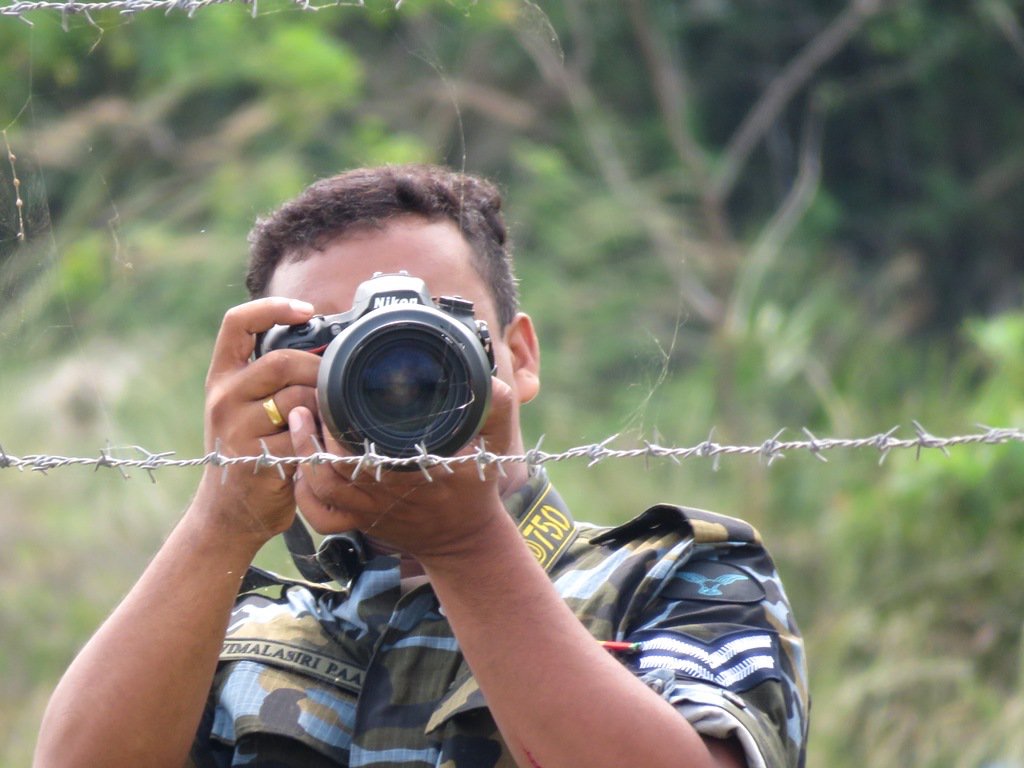
Sri Lankan soldiers photographing Tamil protestors as part of a surveillance, 2017.
“Both within Sri Lanka and further afield, intelligence gathering is now at the heart of security policy and posture,” said Dr Smith, as details of Sri Lanka’s intelligence infrastructure were discussed by the Tribunal. He added that the Sri Lankan state spends a lot of time monitoring and infiltrating groups in a “major, major” way and that Colombo “remains extremely focused on diaspora activities and will likely remain so in the future.”
“Infiltrators, informants, and other forms of surveillance such as taking photographs at demonstrations,” were deployed by the Sri Lankan state to monitor Tamil diaspora activity, he added. “All such intelligence is sent back to the Ministry of Foreign Affairs and then on to relevant intelligence sections within the State Intelligence Service (SIS), Terrorism Investigation Division (TID), Criminal Investigation Department (CID), and the Ministry of Defence.”
A key player in Sri Lanka’s monitoring network is the Defence Attaché at the Sri Lankan High Commission in London, added Dr Smith.

Brigadier Fernando moments after he gestured death threats to Tamil protestors in London, 2018.
The role was previously occupied by Brigadier Priyanka Fernando, an accused war criminal that gestured death threats to Tamil protestors in 2018. After the protestors took Fernando to Magistrate’s court, details of his role at the High Commission were revealed, including the monitoring of anti-government activities such as protests and the regular reporting back to agencies in Sri Lanka. “The Defence Attaché files a weekly report back to the Chief of National Intelligence in Sri Lanka whereupon further analysis is conducted,” Dr Smith added.
“The Sri Lankan authorities therefore possess the wherewithal to identify and detain members of the Tamil diaspora who they perceive to be of potential or existing adverse interest. Once identified they have the legal right under the PTA to detain almost whomsoever they wish. Once detained, Tamils associated with the diaspora are vulnerable and at risk of extreme ill-treatment that will violate their civil liberties and their human rights.”
The details of Tamil diaspora members possessed by the Sri Lankan state is thought to go far beyond the proscribed list of individuals and organisations that Colombo has publically published. Earlier this year the Sri Lankan government has a wide-ranging proscription of hundreds of individuals and several Tamil diaspora organisations, as the regime continued to crack down on Tamil civil society and activists. According to the gazette notification, a number of Tamil organisations and over 300 individuals were re-enlisted under the state’s much-criticised terrorist designation law.
Quoting a source within the SIS, Dr Smith went on to state that there was an electronic database, which underlies Sri Lanka’s ‘stop and watch lists’ and contains many thousands of names. “That database can be consulted at the airport and, if appropriate, an individual could be handed over to the SIS, the TID, or the CID,” he noted. “The information contained on the electronic database remains in place for life.”
International complicity
The role of the British government in monitoring the Tamil diaspora, as well as liaising with the Sri Lankan security services was also raised during the case. Dr Smith states that representatives of the United Kingdom authorities were sometimes present at interviews that were conducted at the Sri Lankan High Commission, though the Home Office responded by stating that “this was not routinely the case”.
The British government’s assessment of the situation for Tamil returnees in Sri Lanka, carried out through a fact-finding mission (FFM) in 2019 also came under fire, after the Tribunal noted that around a half of those interviewed by the mission “were associated with the Sri Lankan state”.
“We find it somewhat surprising that no lawyers and/or academics were interviewed,” the Tribunal noted. “A similar point arises in respect of the selection of only a single human rights activist… only a single source of Tamil ethnicity was interviewed.”
“On the theme of a lack of knowledge displayed by certain sources, it is in our view surprising, to say the least, that one of the two journalist sources interviewed appeared to believe that torture did not occur in Sri Lanka, contrary to the overwhelming weight of expert evidence and country information.”
“There are in our view a number of shortcomings in respect of the FFM which, to an extent, undermine its purported status as a “key” aspect of the evidential picture in these appeals,” it added.
The International Organization for Migration (IOM), another organisation that Britain’s report relied on, also came under fire from the Tribunal after it claimed that allegations of discrimination against Tamils made by members of that community were being put forward to serve their “own ends”. Martin Stares, Head of the Country Policy and Information Team at the UK Home Office, admitted that the IOM’s comments were “quite stark”.
“We agree,” said the Tribunal. “It does not, on its face, sit happily with that organisation’s stated impartiality.”
.jpg)
British High Commissioner Sarah Hulton shaking hands with the war crimes accused Sri Lankan defence secretary in a meeting in Colombo, 2020.
The examination of the FFM report comes as Britain’s ties with the Sri Lankan state continue to come under scrutiny. Just this week, former Scottish Justice Minister and MP Kenny Macaskill raised the resumption of the UK's police training in Sri Lanka. In addition to the training that British authorities have provided, last year in Colombo, Sri Lanka’s war crimes accused defence secretary Kamal Gunaratne called on the UK government to share military intelligence and technology to combat “terrorism”, as he met with Britain’s High Commissioner. Gunaratne told Sarah Hulton that his government was seeking “assistance in sharing military intelligence, technology and expertise in combating terrorism” and slammed what he called “concerted efforts of Tamil diaspora groups… to revive the LTTE”.
Though it was never made public whether such intelligence was actually given, when questioned on whether Sri Lanka security services could access the membership lists of various Tamil diaspora organisations, Professor Gunaratna referred to the use of infiltrators and also suggested that “British services” engaged in “joint operations”.
The Tribunal also raised details around the role of other agencies, including the Australian government, which also continues to foster close relationships with Sri Lanka, supplying the island’s security forces with five aerial drones earlier this year.
The ruling sharply criticised the Australian Department of Foreign Affairs and Trade’s (DFAT) Country Information Report on Sri Lanka, stating “none of the sources are identified, there is no explanation as to how the information from these sources was obtained, and there is no annex containing, for example, records of any interviews.”
“Indeed, it is unclear whether any formal interviews took place,” the Tribunal continued. “The report does not provide direct quotes from any source. In light of these matters, it is difficult to gauge the reliability of the sources which have informed the “judgement and assessment” applied to them by the authors of the report.””
“We’ve said over many years that the DFAT report doesn’t reflect the reality for Tamils in Sri Lanka,” said Aran Mylvaganam from the Tamil Refugee Council, one of several organisations to reiterate their concerns over the Australian report this week. “It is written to undermine Tamils’ protection claims. Successive Australian governments have used DFAT reports to justify deportation of Tamils back to danger.”
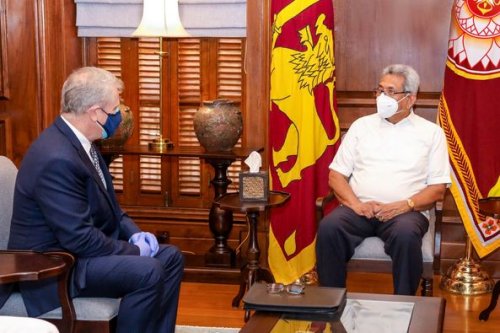
Australian High Commissioner to Sri Lanka, David Holly meeting with Rajapaksa last month.
Casting a wider net
Given the evidence before the Tribunal, it concluded that “an authoritarian government committed to suppressing the (actual or perceived) resurrection of separatism within its territory is, in our view, more likely to cast the net widely to ensure appropriate coverage in furtherance of its objective”.
In 2012, alarmed at reports of extensive surveillance of the Tamil diaspora by Sri Lankan embassies abroad, TAG (then Tamils Against Genocide) intervened in the then Sri Lankan county guidance case (GJ & others) to seek to introduce political activists as a ‘category at risk’. Although TAG succeeded, the Home Office continued to interpret the category narrowly.
The latest decision however is a significant one, running contrary to previous claims by the UK Home Office that Tamils had to have a “significant role” through taking on formal positions in organisations or engage in particularly high-profile activities to be at risk. Indeed, the Tribunal noted that an “indicator-based” approach was a more “accurate reflection of the reality of the current position”. This included taking into account activities such as attending meetings and demonstrations, holding flags or banners displaying the LTTE emblem, attendance at commemorative events, meaningful fundraising, any presence on social media, signing petitions perceived to be anti-government and political lobbying.
The Tribunal went on to note that the HJ (Iran) principle may be applied in the case of Sri Lanka, where those that hold genuine political beliefs on the issue of Tamil separatism would, on return to Sri Lanka, be forced to conceal or modify the expression of those beliefs in order to avoid persecution.
“In our judgment, it is wrong in principle to expect an individual who holds a particular set of political beliefs to “make do”, as it were, with another, solely in order to avoid persecution or serious harm,” the Tribunal noted. “This would amount to a material modification of the protected right. To conclude otherwise would run the risk of diluting the protection afforded by the Refugee Convention.”
“It is abundantly clear that there is a reasonable likelihood that those detained by the Sri Lankan authorities will be subjected to persecution,” the Tribunal continued.
It went on to successfully allow the appeal of KK, a Tamil asylum seeker who initially had his claim denied as an earlier ruling found that he had not “played any significant role” within the Transnational Government of Tamil Eelam (TGTE) diaspora organisation.
The Tribunal also successfully allowed the appeal of RS, another Tamil asylum seeker who they concluded had undertaken activities “out of a genuine commitment to Tamil separatism” and is the long-term partner of an individual who is also “actively involved” with both the TGTE and Tamil Solidarity. “Her assessed profile will, we conclude, place her in the category of persons included in the watch list who are of sufficient adverse interest to warrant attention on their arrival,” said the Tribunal.
Both appellants also succeeded on the basis of HJ (Iran).
A landmark ruling
Australians marching against the continued detention of Tamil asylum seekers earlier this year.
“The current Sri Lankan government is clearly tough towards Tamils,” said Mackenzie. “There is an assumption by some decision makers that the GOSL are decent people that occasionally step over the line and they won’t detain you if you only speak of human rights. That is just wrong. They have a broad understanding of what is ‘separatist’ or ‘LTTE’ activities. And they are constantly monitoring what takes place.”
“The Tribunal importantly acknowledged that the types of activities of interest to the GoSL that may place a person at risk of persecution are broader than just involvement with named Tamil diaspora organisation,” continued Mackenzie, a barrister Doughty Street Chambers, who will be hosting a discussion on the ruling next week.
“It’s been a long haul,” Mackenzie continued, when asked about the significance of the case. “It’s a case that will likely be looked at by other refugee groups around the world when it comes to the deportation of Tamil asylum seekers to Sri Lanka, in Australia for example.”
Indeed, the case is likely to have implications across the globe where Tamil asylum seekers continue to face the risk of deportation. Several organisations in Australia have already reacted to the British ruling, calling on Australian authorities to halt the deportations of Tamils to Sri Lanka, where they face the risk of torture. “The UK’s country guidance decision is further confirmation that the DFAT report cannot be relied on and must be set aside,” said Rawan Arraf, Executive Director, Australian Centre for International Justice this week. “For the people affected there is too much at stake.”
In Germany this week reports emerged that authorities are planning to deport more Tamil refugees to Sri Lanka, just weeks after an estimated 100 Tamil asylum seekers were detained by authorities following a series of raids.
“They are all at risk,” a German Tamil activist told the Tamil Guardian. “The British ruling just reaffirms what we already know about the dangers Tamils face in Sri Lanka.”
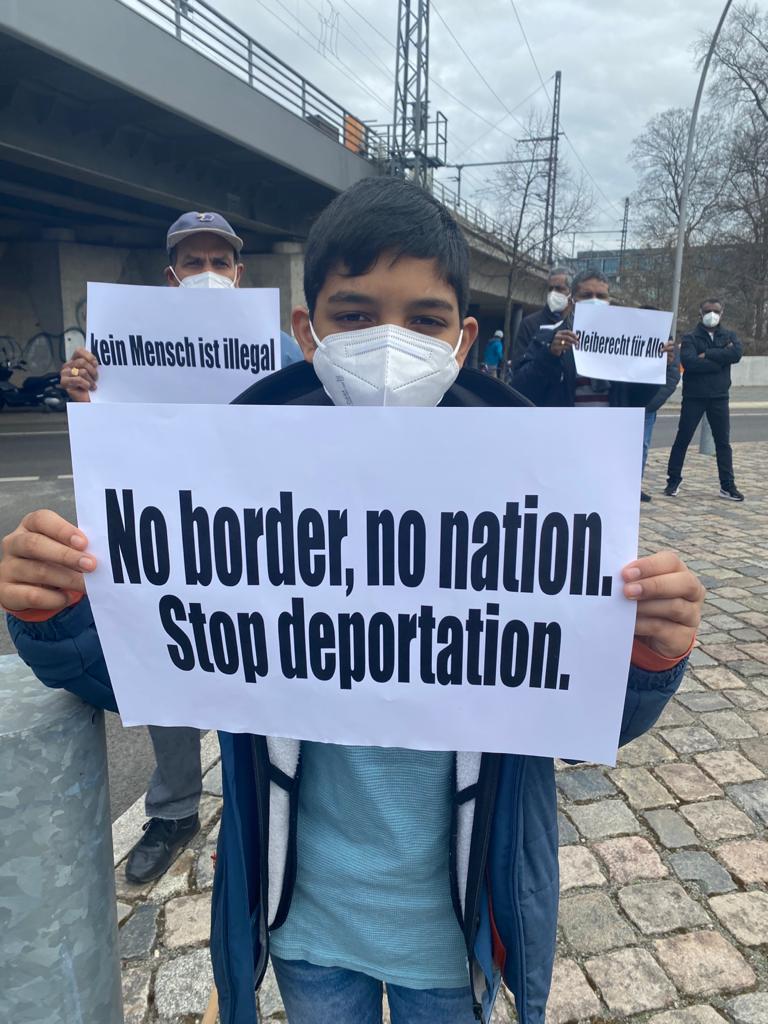
German Tamils protested against the detention over almost 100 Tamil asylum seekers earlier this year.
“Broadly many more Tamil activists will be entitled to asylum than before,” tweeted Mackenzie, in a thread explaining details from the ruling. “In its new judgment, the Tribunal takes on & corrects some of these misapprehensions, on the basis of extensive evidence.”
“Good news for activists,” added the Immigration and Public Law Team at Goldsmith Chambers.
“The Home Office has been failing Tamil refugees for decades and their approach to this case was no exception,” added Laura Smith, a solicitor at the Joint Council for the Welfare of Immigrants, that represented one of the appellants. “Arguing that returnees should save themselves by agreeing to inform on their community and thereby offering them up to torture is a truly shameful argument from government. It is a great relief that their arguments and “Fact Finding Mission” were rejected and the resulting guidance from the Tribunal is helpful for anyone who supports the creation of a separate Tamil state.”
"This judgment is a landmark, in that it recognises the paranoia of the Sinhala state such that those who hold a belief in Tamil independence qualify as refugees," Jananayagam told the Tamil Guardian. "Congratulations again to the legal teams of the refugees and indeed to the dedicated community of lawyers who continue to pursue refugee rights in Britain."
_____
See the full text of the judgement here.
See details of an online seminar hosted by Doughty Street Chambers discussing the new country guidance framework and its application to Sri Lankan asylum claims here.

